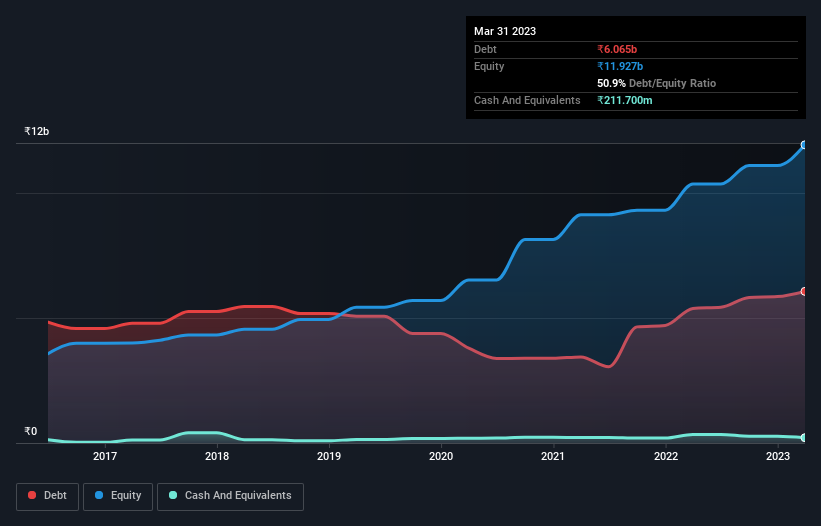
Howard Marks put it nicely when he said that, rather than worrying about share price volatility, 'The possibility of permanent loss is the risk I worry about... and every practical investor I know worries about.' So it might be obvious that you need to consider debt, when you think about how risky any given stock is, because too much debt can sink a company. We can see that Aarti Drugs Limited (NSE:AARTIDRUGS) does use debt in its business. But should shareholders be worried about its use of debt?
Why Does Debt Bring Risk?
Generally speaking, debt only becomes a real problem when a company can't easily pay it off, either by raising capital or with its own cash flow. In the worst case scenario, a company can go bankrupt if it cannot pay its creditors. While that is not too common, we often do see indebted companies permanently diluting shareholders because lenders force them to raise capital at a distressed price. Having said that, the most common situation is where a company manages its debt reasonably well - and to its own advantage. The first step when considering a company's debt levels is to consider its cash and debt together.
View our latest analysis for Aarti Drugs
What Is Aarti Drugs's Net Debt?
The image below, which you can click on for greater detail, shows that at March 2023 Aarti Drugs had debt of ₹6.07b, up from ₹5.38b in one year. However, it also had ₹211.7m in cash, and so its net debt is ₹5.85b.

A Look At Aarti Drugs' Liabilities
Zooming in on the latest balance sheet data, we can see that Aarti Drugs had liabilities of ₹9.33b due within 12 months and liabilities of ₹2.96b due beyond that. Offsetting this, it had ₹211.7m in cash and ₹8.65b in receivables that were due within 12 months. So its liabilities outweigh the sum of its cash and (near-term) receivables by ₹3.43b.
Given Aarti Drugs has a market capitalization of ₹42.6b, it's hard to believe these liabilities pose much threat. But there are sufficient liabilities that we would certainly recommend shareholders continue to monitor the balance sheet, going forward.
In order to size up a company's debt relative to its earnings, we calculate its net debt divided by its earnings before interest, tax, depreciation, and amortization (EBITDA) and its earnings before interest and tax (EBIT) divided by its interest expense (its interest cover). This way, we consider both the absolute quantum of the debt, as well as the interest rates paid on it.
Aarti Drugs's net debt of 1.9 times EBITDA suggests graceful use of debt. And the fact that its trailing twelve months of EBIT was 7.7 times its interest expenses harmonizes with that theme. The bad news is that Aarti Drugs saw its EBIT decline by 11% over the last year. If earnings continue to decline at that rate then handling the debt will be more difficult than taking three children under 5 to a fancy pants restaurant. When analysing debt levels, the balance sheet is the obvious place to start. But it is future earnings, more than anything, that will determine Aarti Drugs's ability to maintain a healthy balance sheet going forward. So if you want to see what the professionals think, you might find this free report on analyst profit forecasts to be interesting.
But our final consideration is also important, because a company cannot pay debt with paper profits; it needs cold hard cash. So we always check how much of that EBIT is translated into free cash flow. Considering the last three years, Aarti Drugs actually recorded a cash outflow, overall. Debt is far more risky for companies with unreliable free cash flow, so shareholders should be hoping that the past expenditure will produce free cash flow in the future.
Our View
Both Aarti Drugs's conversion of EBIT to free cash flow and its EBIT growth rate were discouraging. But its not so bad at covering its interest expense with its EBIT. Taking the abovementioned factors together we do think Aarti Drugs's debt poses some risks to the business. So while that leverage does boost returns on equity, we wouldn't really want to see it increase from here. There's no doubt that we learn most about debt from the balance sheet. But ultimately, every company can contain risks that exist outside of the balance sheet. For instance, we've identified 2 warning signs for Aarti Drugs that you should be aware of.
If, after all that, you're more interested in a fast growing company with a rock-solid balance sheet, then check out our list of net cash growth stocks without delay.
New: Manage All Your Stock Portfolios in One Place
We've created the ultimate portfolio companion for stock investors, and it's free.
• Connect an unlimited number of Portfolios and see your total in one currency
• Be alerted to new Warning Signs or Risks via email or mobile
• Track the Fair Value of your stocks
Have feedback on this article? Concerned about the content? Get in touch with us directly. Alternatively, email editorial-team (at) simplywallst.com.
This article by Simply Wall St is general in nature. We provide commentary based on historical data and analyst forecasts only using an unbiased methodology and our articles are not intended to be financial advice. It does not constitute a recommendation to buy or sell any stock, and does not take account of your objectives, or your financial situation. We aim to bring you long-term focused analysis driven by fundamental data. Note that our analysis may not factor in the latest price-sensitive company announcements or qualitative material. Simply Wall St has no position in any stocks mentioned.
About NSEI:AARTIDRUGS
Aarti Drugs
Through its subsidiaries, manufactures and markets active pharmaceutical ingredients (APIs), pharmaceutical intermediates, specialty chemicals, and formulations in India and internationally.
Excellent balance sheet with reasonable growth potential.
Similar Companies
Market Insights
Community Narratives




